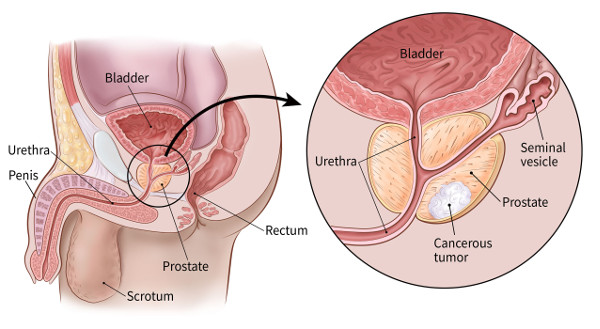Prostate health is a concern for many men, particularly as they age. The prostate gland is an important part of the male reproductive system and can be impacted by a variety of factors, including diet. In this article, we will discuss dietary changes that every man should know for maintaining good prostate health.
Understanding Prostate Health
The prostate gland is a small, walnut-shaped gland that is part of the male reproductive system. It is located just below the bladder and surrounds the urethra, which is the tube that carries urine and semen out of the body. The main function of the prostate gland is to produce and secrete fluid that makes up a part of semen.
One common prostate health issue is benign prostatic hyperplasia (BPH), which is a non-cancerous enlargement of the prostate gland. Symptoms of BPH include frequent urination, weak urine flow, and difficulty starting and stopping urination.
Another prostate health concern is prostate cancer, which is the most common cancer among men. It occurs when abnormal cells grow and multiply uncontrollably in the prostate gland. Symptoms of prostate cancer may include difficulty urinating, blood in the urine or semen, and pain in the lower back, hips, or thighs.
According to the American Cancer Society, about 1 in 8 men will be diagnosed with prostate cancer in their lifetime. It is important for men to understand the basics of prostate health and be aware of the risk factors and symptoms of prostate health issues.

Nutrients for Prostate Health
Incorporating certain nutrients into your diet can help support prostate health. Here are some key nutrients and vitamins to consider:
-
Zinc: Zinc is important for the health and function of the prostate gland. It has been shown to help reduce the risk of prostate cancer and may also help alleviate symptoms of BPH. You can get zinc from foods such as oysters, beef, chicken, and beans.
-
Vitamin D: Vitamin D is essential for overall health, including prostate health. Studies have shown that low levels of vitamin D are associated with an increased risk of prostate cancer. You can get vitamin D from foods such as fatty fish, egg yolks, and fortified milk, or from spending time in the sun.
-
Lycopene: Lycopene is a powerful antioxidant that has been shown to help reduce the risk of prostate cancer. It is found in foods such as tomatoes, watermelon, and grapefruit.
-
Selenium: Selenium is a mineral that helps protect against cell damage and has been linked to a reduced risk of prostate cancer. You can get selenium from foods such as Brazil nuts, tuna, and whole wheat bread.
-
Green tea: Green tea contains compounds called catechins, which have been shown to have anti-cancer properties. Studies have suggested that green tea may help reduce the risk of prostate cancer.
Incorporating these nutrients into your diet can be as simple as adding some nuts or seeds to your morning oatmeal or having a serving of fatty fish for dinner a few times a week. Additionally, taking a daily multivitamin can also help ensure that you are getting all the essential nutrients your body needs for optimal health.
Foods to Avoid for Prostate Health
While certain nutrients and vitamins are important for prostate health, there are also foods and substances that may have a negative impact on prostate health. Here are some examples of foods and substances to avoid or limit in your diet:
-
Red meat: Eating a lot of red meat, especially processed meat, has been linked to an increased risk of prostate cancer. Try to limit your intake of beef, pork, and lamb, and opt for lean protein sources like chicken, fish, and plant-based proteins.
-
Dairy products: Studies have shown that high consumption of dairy products, particularly whole milk, may increase the risk of prostate cancer. Try swapping out dairy milk for plant-based milk alternatives like almond, soy, or oat milk.
-
Alcohol: Drinking excessive amounts of alcohol can increase inflammation in the body, which may contribute to prostate health issues. Try to limit your alcohol intake to one or two drinks per day, or eliminate it altogether.
-
Caffeine: While caffeine in moderation is generally safe, consuming too much can cause dehydration and irritate the bladder, which may exacerbate prostate health issues. Try to limit your caffeine intake and opt for decaf options.
-
High-fat foods: Foods high in unhealthy fats, such as fast food, fried foods, and processed snacks, may contribute to inflammation in the body and increase the risk of prostate health issues. Instead, focus on eating a diet rich in fruits, vegetables, and whole grains.
It's important to note that moderation is key. You don't have to completely eliminate these foods and substances from your diet, but it's a good idea to limit your intake and focus on a balanced, healthy diet.
In the next section, we'll discuss lifestyle changes that can also impact prostate health.
Lifestyle Changes for Prostate Health
Maintaining a healthy lifestyle is crucial for overall prostate health. In this section, we will discuss the importance of exercise and physical activity, weight management, and stress management for maintaining good prostate health.
Exercise and Physical Activity
Regular physical activity is essential for good prostate health. Studies have shown that exercise can help reduce the risk of prostate cancer and other prostate health issues. Exercise can also help maintain a healthy weight, which is important for prostate health.
Some types of exercise that are particularly beneficial for prostate health include aerobic exercise, such as running, swimming, or cycling, and resistance training, such as weightlifting. It is recommended that adults engage in at least 150 minutes of moderate-intensity exercise or 75 minutes of vigorous-intensity exercise each week.
Weight Management
Maintaining a healthy weight is also important for prostate health. Obesity has been linked to an increased risk of prostate cancer, as well as other health issues. Losing weight and maintaining a healthy weight can help reduce the risk of prostate cancer and other prostate health issues.
A healthy diet that is rich in fruits, vegetables, and whole grains can help with weight management. It is also important to limit intake of high-fat and high-calorie foods.
Stress Management
Stress can have negative impacts on prostate health. Chronic stress can lead to inflammation, which can contribute to prostate health issues. It is important to manage stress through various techniques, such as exercise, meditation, or other relaxation techniques.
Regular exercise is an effective way to manage stress. Other stress management techniques include deep breathing, yoga, and mindfulness meditation. It is also important to identify and avoid triggers of stress, and to seek support from friends, family, or mental health professionals when necessary.
In conclusion, making lifestyle changes such as regular exercise, maintaining a healthy weight, and managing stress can have a positive impact on prostate health. By adopting these healthy habits, men can reduce their risk of prostate health issues and improve their overall quality of life.

Conclusion
Maintaining good prostate health is essential for every man, and dietary changes play a significant role in this. In this article, we have discussed the basic anatomy and function of the prostate gland, common prostate health issues, and nutrients that support prostate health, such as zinc and vitamin D. We have also highlighted foods and substances to avoid for good prostate health, such as red meat, dairy products, and alcohol, and provided alternatives for a healthy, balanced diet. Additionally, we have emphasized the importance of exercise, weight management, and stress management for maintaining good prostate health.
It is crucial for readers to take action by making dietary and lifestyle changes for their prostate health, such as incorporating more plant-based foods, reducing red meat consumption, and staying active. By doing so, men can reduce their risk of developing prostate health issues and maintain their overall well-being. We encourage readers to share their experiences and tips for maintaining good prostate health in the comments below.







